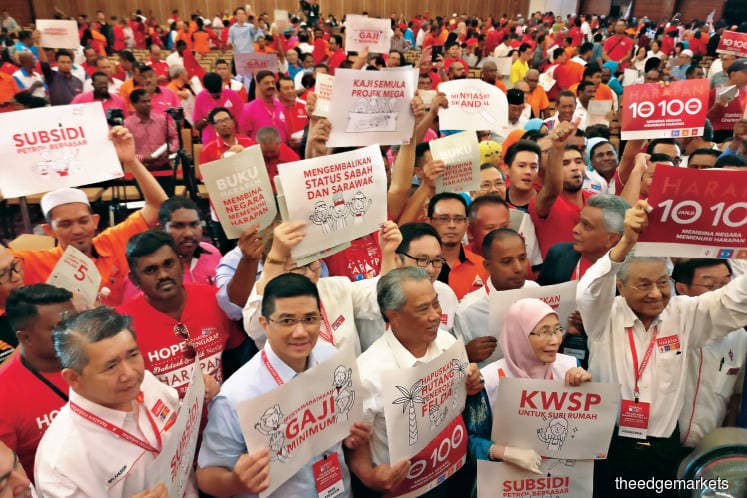
This article first appeared in The Edge Malaysia Weekly on March 12, 2018 - March 18, 2018
THE Pakatan Harapan coalition made an early move for the people’s support in the much-anticipated 14th general election with a manifesto that promises to tackle major issues that have dominated the headlines.
The opposition grouping’s main message can be summed up as “vote us for a better standard of living and clean government”.
The manifesto is based on five thrusts:
• Lighten the cost of living
• Reform the nation’s administration and politics
• Spur economic growth in a fair and just manner
• Restore the rights of Sabah and Sarawak based on the Malaysia Agreement 1963, and
• Build an inclusive and moderate nation.
These goals are spelt out in 60 promises to address economic and political issues, and five commitments to Felda settlers, the Indian community, women, youth and senior citizens.
A promise to replace the unpopular Goods and Services Tax with a Sales and Services Tax taps into deep discontent over the rising cost of living.
Public unhappiness with the monopoly position of Padiberas Nasional Bhd for rice imports and Astro Malaysia Holdings Bhd for satellite TV is met with a pledge to change the rules.
The proposed deferment of student loan payments for borrowers who earn less than RM4,000 relieves the burden of young employees struggling to make ends meet.
Likewise, a promise to abolish highway tolls is geared to win over a public that is highly dependent on road transport.
Rising fuel prices, another hot topic in the public debate on the cost of living, is met with a plan to have targeted petrol subsidies.
Concern over healthcare cost inflation is addressed by a promise to improve accessibility and ensure quality in public healthcare.
Pakatan said it will review the country’s tax system to ensure it is competitive in the Asean region and so that the country’s wealth is shared fairly.
The political bloc pledged to reduce income tax for the M40 group. Also, the tax system review will concentrate on small and medium businesses in view of the sector’s 40% contribution to the gross domestic product and because it represents 97% of all Malaysian companies.
Pakatan also announced its intention to reduce the country’s reliance on foreign workers, and increase the minimum wage in Sabah and Sarawak to be in line with that of Peninsular Malaysia.
It will raise the minimum wage for the whole country to RM1,500 monthly in the first term of its administration.
The manifesto suggests that the government and employers equally share the cost of increase in minimum wage.
In the fifth thrust, Pakatan promises to improve education quality by providing free higher education and giving more autonomy to universities. It also aims to reduce crime and social problems by increasing the budget allocation to the police.
The highest number of promises is in the second thrust, which encompasses 19 steps to reform the government. Prominent among them is a pledge to limit the tenure of the prime minister and chief ministers to two terms.
Pakatan said it will ensure all those involved in corruption scandals like the 1Malaysia Development Bhd (1MDB) state investment fund saga would be brought to justice by forming a Royal Commission of Inquiry to investigate and make recommendations on appropriate actions to be taken.
The coalition also promises to upgrade the Malaysian Anti-Corruption Commission (MACC) to be recognised under the Federal Constitution, similar to the Election Commission, where the MACC will have autonomy and a specific budget allocation.
With the upgrade, MACC will report directly to Parliament instead of to the prime minister.
Other promises to improve governance include separating the powers of the public prosecutor from the Attorney-General’s (AG) Chambers, where the AG will be a qualified member of Parliament that acts as a law adviser to the government, while the public prosecutor has to be an independent individual without any affiliation to political parties.
The fourth thrust in the manifesto focuses specifically on Sabah and Sarawak. It aims to reinstate the states’ rights under the Malaysia Agreement 1963.
Promising to grow the economy and social development of the two states, Pakatan pledged to decentralise fiscal administration to Sabah and Sarawak, where 50% of tax revenue in both states would be spent locally.
Pakatan also made commitments to Federal Land Development Authority (Felda) settlers, including reducing their debts and providing quality higher education to their children.
For the Indian community, apart from better education and more job opportunities, the coalition committed to ensure that 10% of recruitments in government linked-companies will be made from the community.
Commitments to women include incentives to employers that provide childcare facilities at or adjacent to the workplace, Employees Provident Fund contribution for housewives from 2% of their husbands’ monthly contributions, and RM50 monthly from the government.
Commitments to the youth mainly revolves around job opportunities, cost-of-living issues, affordable homes, free quality education and more recreation and sports facilities to promote work-life balance.
For senior citizens, Pakatan said it is committed to expand the RM150 handout in Penang to the whole country, while increasing the budget allocation to public hospitals and aged care centres.
Other policies include introducing laws to prevent age discrimination and subsidies and incentives to encourage development of retirement villages that ensure better quality of life for the ageing community.
Save by subscribing to us for your print and/or digital copy.
P/S: The Edge is also available on Apple's AppStore and Androids' Google Play.